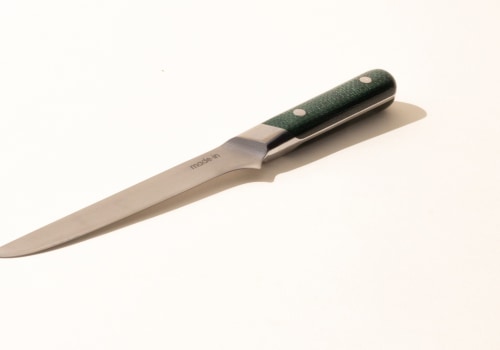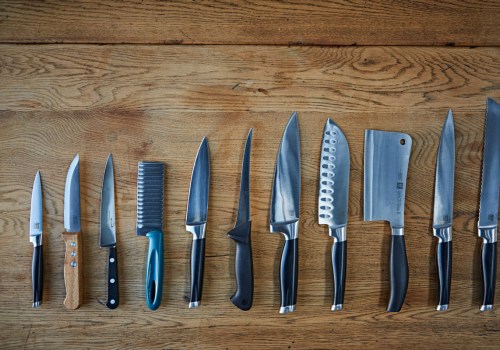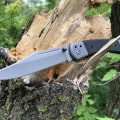Damascus steel knives are renowned for their strength, durability, and beauty. They are also highly sought after by knife enthusiasts and collectors alike. From their origins in the Middle East to their modern-day popularity, Damascus steel knives have a rich history that is worth exploring. In this article, we will take an in-depth look at Damascus steel knives, including their unique characteristics, common uses, and how to properly care for them.
We hope that by the end of this article, you will have a better understanding of the allure of these special knives and why they are so highly prized. The history of Damascus steel knives dates back to the Middle Ages in India and the Middle East, where it became known for its strength and durability. The manufacturing process involved folding and forging multiple layers of metal together to create a blade with a unique pattern. This gave the blades a distinctive look that set them apart from other blades. Today, Damascus steel knives are still highly sought after by collectors and everyday users alike. The process for crafting Damascus steel knives is labor-intensive and requires a great deal of skill.
It begins with the selection of different metals that will be used in the blade. The metals are then heated until they’re malleable enough to be folded together multiple times. This process is repeated several times until the desired pattern is achieved. Once the folding process is complete, the blade is forged into shape using a hammer and anvil.
This final step ensures that the blade is strong enough for daily use. The result is a blade with a unique pattern that is both aesthetically pleasing and incredibly strong. The unique patterns are created by the alternating layers of different metals that are folded together during the manufacturing process. In addition to its unique appearance, Damascus steel knives are known for their strength and durability. The folding process helps to create a blade that is both strong and corrosion-resistant.
It also has excellent edge retention, meaning it will hold its sharpness for longer periods of time than other types of blades. Damascus steel knives are also highly sought after for their craftsmanship. Each blade is handmade, making them highly collectible items. They’re also ideal for everyday use, as they can handle tough tasks with ease. Overall, Damascus steel knives have a lot to offer both collectors and everyday users alike. From their unique patterns to their strength and durability, they’re sure to make a great addition to any collection or kitchen.
History of Damascus Steel Knives
The history of Damascus steel knives dates back to the Middle Ages in India and the Middle East, where it became renowned for its strength and durability.Damascus steel was first developed by combining different types of steel and hammering it into thin layers, resulting in a blade with a unique patterned design. This process was labor-intensive and required a great deal of skill, which made Damascus steel knives highly sought after for both collectors and everyday use. The Damascus steel forging process was perfected by the Middle Eastern swordsmiths, who kept their techniques a closely-guarded secret. As a result, few other cultures were able to replicate the process and create their own Damascus steel knives. Throughout the centuries, Damascus steel knives have been used by warriors and hunters, as well as by chefs and butchers.
Today, these knives are still highly prized for their strength and durability.
Manufacturing Process
The manufacturing process of Damascus steel knives is complex and labor-intensive. It involves folding and forging multiple layers of metal together to create a blade with a unique pattern. The process begins with the selection of high-quality raw materials, such as carbon steel and nickel steel. These are heated in a furnace and then placed in a hammering machine, where they are repeatedly hammered and folded over one another.This creates several layers of metal, which are then annealed to form a single piece. The blade is then put through a tempering process, which gives it strength and flexibility. The final step of the process is to etch the blade with acid, which reveals the unique pattern of the Damascus steel. This process requires a great deal of skill, as the patterns can vary depending on the artisan’s technique. Once completed, the blade is polished to create a stunningly beautiful finish.
Qualities and Uses
Damascus steel knives are renowned for their strength and durability, edge retention, and craftsmanship.The high-carbon steel used to create Damascus steel knives is incredibly strong and resistant to corrosion, making it ideal for use in a variety of applications. The patterned design of Damascus steel knives also makes them stand out from other types of knives, making them highly sought after by collectors and everyday users alike. The strength and durability of Damascus steel knives is due to its structure. It is composed of two different types of steel - one softer and one harder - which are layered and folded together. This creates a pattern within the blade which gives the knives their distinctive look.
This process also adds strength to the blade, as the layers of metal help to reinforce the structure and prevent breakage. The edge retention of Damascus steel knives is also impressive. The high-carbon steel used in the manufacturing process ensures that the blade can maintain its sharpness even after extensive use. This makes them a great choice for everyday tasks like slicing fruits and vegetables, as well as more specialized tasks such as hunting or bushcraft. Finally, the craftsmanship involved in creating Damascus steel knives is what really sets them apart. The time and skill required to produce these blades means that they are highly sought after by collectors and everyday users alike.
The attention to detail and precision involved in crafting each knife makes them truly unique and something to be admired. Overall, Damascus steel knives have a lot to offer both collectors and everyday users alike. From their unique patterns and strength to their durability, they make an excellent addition to any collection or kitchen. Their labor-intensive manufacturing process requires skill and expertise, making them highly sought after by knife enthusiasts. Whether for everyday use or for collection purposes, Damascus steel knives are a great choice.







Leave Reply